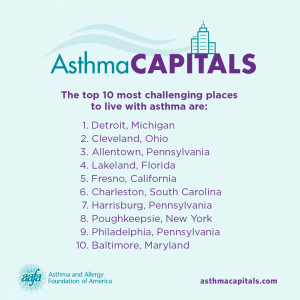Detroit tops list of worst places for people with asthma
The Asthma and Allergy Foundation ranks Detroit as the most challenging city for people with asthma. But the group has a plan to help.

An aerial view of the former Detroit incinerator, which closed in 2019 and was demolished in 2023.
Asthma has been a chronic health problem in Detroit for years. But a new report ranks the city the worst place for people with asthma to live.
“We’re looking at not only helping people access specialty care with an allergy doctor and an asthma doctor, but providing them with excellent self-managed education.” — Kathleen Slonager, executive director of the Asthma and Allergy Foundation of America’s Michigan chapter.
The Asthma and Allergy Foundation of America ranked the nation’s 100 most populous cities based on the total number of people with asthma, as well as asthma-related rates of death and emergency room visits.
Although Detroit did not rank first in any of those categories, it had the highest overall score among the cities rated.
The full Asthma Capitals report can be found here.
Kathleen Slonager is the executive director of AAFA’s Michigan chapter. She says several factors affect Detroit’s asthma problem.
“Air pollution, poverty rates, access to quality care including specialty care, and a lack of health insurance,” she says. “Unfortunately, a lot of people still don’t have health insurance.”
Slonager says one reason why people don’t have health coverage is that they don’t know where or how to get it.
AAFA has crafted a plan to address that. The Health Equity Advancement and Leadership program (HEAL) provides grants to cities where asthma is endemic. Slonager says each city develops and implements programs that meet the particular needs of its residents.
In Detroit, she says her chapter will take a holistic approach.
Related: A new short film shows how air pollution affects a Detroit family with asthma
“We’re looking at not only helping people access specialty care with an allergy doctor and an asthma doctor, but providing them with excellent self-managed education,” Slonager says. “And access to clean and fresh food, exercise, talking over their issues with a nutritionist and providing technology support if they don’t have it.”
Slonager says HEAL will also help people with asthma find health insurance if they need it.
“If for whatever reason they can’t get health insurance, we have the funding to help support all these programming steps so they will not be left in the dark,” she says.
Listen: How the Michigan Asthma and Allergy Foundation plans to help Detroit residents.
Trusted, accurate, up-to-date.
WDET strives to make our journalism accessible to everyone. As a public media institution, we maintain our journalistic integrity through independent support from readers like you. If you value WDET as your source of news, music and conversation, please make a gift today.

